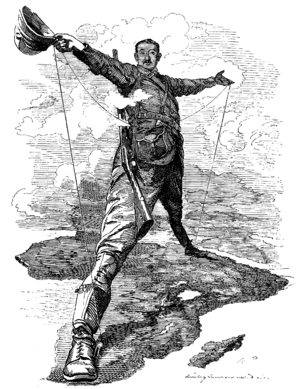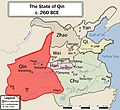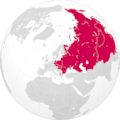Imperialism facts for kids

Imperialism is when a strong country tries to control other countries or regions. It's like a powerful nation wanting to expand its influence beyond its own borders. The main goal of imperialism is to build a large empire.
Imperialist countries take over other lands. They might use their army to do this. But sometimes, they gain control without fighting. They can do it by taking over the other country's economy or government.
When a country practices imperialism, it wants more land to make its empire bigger.
The ruler of an empire gains many things. They get natural resources like farm products and minerals. They also gain human resources. People in the conquered lands might be made to work for the empire or join its army. New markets for trade are also gained. The people under an imperial government might be forced to buy products from that government or its businesses.
So, imperialism can make the powerful country very rich. This benefit can last for a long time.
People have practiced imperialism throughout history. But there's a special time called the Age of Imperialism. This period lasted from the early 1700s to the mid-1900s.
The Age of Imperialism
During the Age of Imperialism, modern and industrial countries competed. They wanted to control parts of the world that were not yet industrialized. In these areas, natural resources and workers were easy to find and cheap. The countries that built the biggest empires during this time were the United Kingdom, France, Germany, Japan, and the United States.
Some people use the word "imperialism" more generally. They use it to mean any time one country dominates another part of the world. This kind of control happened a lot in Asia and Africa.
Images for kids
-
Provinces of the Roman Empire around 117 AD
-
The end result of the Boer Wars was the annexation of the Boer Republics to the British Empire in 1902.
-
Smoke rises from oil tanks beside the Suez Canal hit during the initial Anglo-French assault on Egypt, 5 November 1956
-
Japanese march into Zhengyangmen of Beijing after capturing the city in July 1937.
-
Ottoman troops marching in Aleppo
-
Areas across the world that were, at one point in their history, part of the Portuguese Empire
-
The maximum territorial extent of countries in the world under Soviet influence, after the Cuban Revolution of 1959 and before the official Sino-Soviet split of 1961
-
Ceremonies during the annexation of the Republic of Hawaii, 1898
-
Cartoon of belligerent Uncle Sam placing Spain on notice, c. 1898
See also
 In Spanish: Imperialismo para niños
In Spanish: Imperialismo para niños
 | Selma Burke |
 | Pauline Powell Burns |
 | Frederick J. Brown |
 | Robert Blackburn |





















